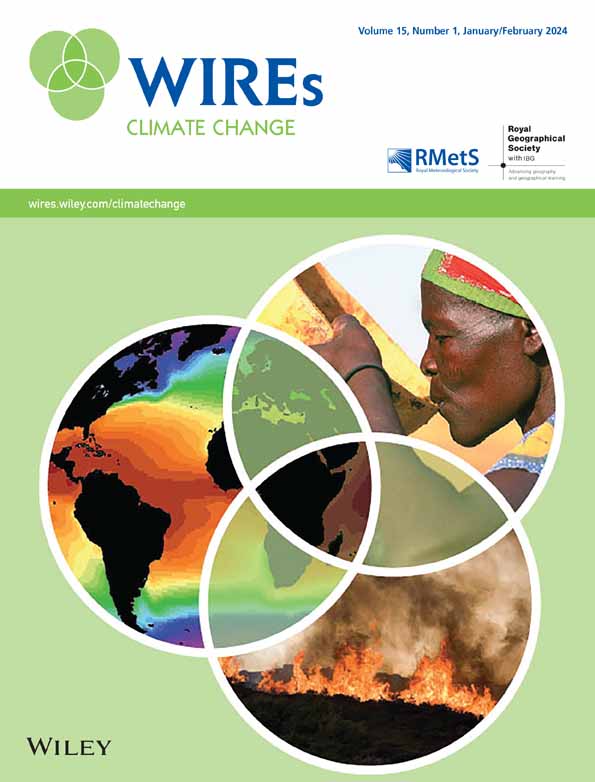关于气候变化影响模式的评估
IF 10.3
1区 环境科学与生态学
Q1 ENVIRONMENTAL STUDIES
引用次数: 14
摘要
在制定适应策略和设计适合未来条件的基础设施时,需要深入了解气候变化的潜在影响,以指导决策者和决策者。需要将潜在的未来气候条件转化为感兴趣的变量的影响模型,以便在气候变化及其对不同部门的影响之间建立因果关系。最近的调查表明,验证这些模型的主要策略(并因此证明其使用的合理性)严重依赖于通过将模型模拟与历史观测结果进行比较来评估模型模拟的准确性。我们认为,这样的比较是必要和有价值的,但不足以实现对气候变化影响模型的全面评估。我们认为,需要一个互补的、在很大程度上与观测无关的模型评估步骤,以确保模型行为的透明度和基于情景的分析的更强的鲁棒性。这一步应该解决以下四个问题:(1)建模的主导过程控制是否与我们的系统感知相匹配?(2)模型对强迫变化的敏感性是否符合预期?(3)建模的决策杠杆是否显示出足够的影响?(4)我们能否在整个投影范围内确定不确定性来源?我们认为,全局敏感性分析能够以结构化的方式研究模型对多个输入的联合变化的响应,为全面解决所有四个问题提供了一致的方法。这种额外的模式评价将增强利益攸关方对模式预测的信心,从而增强他们对借助影响模型得出的适应战略的信心。本文章由计算机程序翻译,如有差异,请以英文原文为准。
On the evaluation of climate change impact models
In‐depth understanding of the potential implications of climate change is required to guide decision‐ and policy‐makers when developing adaptation strategies and designing infrastructure suitable for future conditions. Impact models that translate potential future climate conditions into variables of interest are needed to create the causal connection between a changing climate and its impact for different sectors. Recent surveys suggest that the primary strategy for validating such models (and hence for justifying their use) heavily relies on assessing the accuracy of model simulations by comparing them against historical observations. We argue that such a comparison is necessary and valuable, but not sufficient to achieve a comprehensive evaluation of climate change impact models. We believe that a complementary, largely observation‐independent, step of model evaluation is needed to ensure more transparency of model behavior and greater robustness of scenario‐based analyses. This step should address the following four questions: (1) Do modeled dominant process controls match our system perception? (2) Is my model's sensitivity to changing forcing as expected? (3) Do modeled decision levers show adequate influence? (4) Can we attribute uncertainty sources throughout the projection horizon? We believe that global sensitivity analysis, with its ability to investigate a model's response to joint variations of multiple inputs in a structured way, offers a coherent approach to address all four questions comprehensively. Such additional model evaluation would strengthen stakeholder confidence in model projections and, therefore, into the adaptation strategies derived with the help of impact models.
求助全文
通过发布文献求助,成功后即可免费获取论文全文。
去求助
来源期刊

Wiley Interdisciplinary Reviews: Climate Change
METEOROLOGY & ATMOSPHERIC SCIENCES-
CiteScore
20.00
自引率
2.20%
发文量
58
审稿时长
>12 weeks
期刊介绍:
WIREs Climate Change serves as a distinctive platform for delving into current and emerging knowledge across various disciplines contributing to the understanding of climate change. This includes environmental history, humanities, physical and life sciences, social sciences, engineering, and economics. Developed in association with the Royal Meteorological Society and the Royal Geographical Society (with IBG) in the UK, this publication acts as an encyclopedic reference for climate change scholarship and research, offering a forum to explore diverse perspectives on how climate change is comprehended, analyzed, and contested globally.
 求助内容:
求助内容: 应助结果提醒方式:
应助结果提醒方式:


